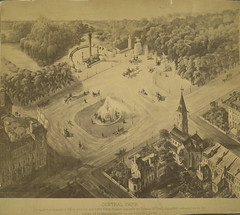My colleagues and I often discuss the importance of coordinated planning for all municipalities and governments to create a healthier city and citizens. In Bronfenbrenner's Ecological Systems Theory - he posits that we each have multiple environmental systems that influence our development physically, cognitively, and affectively (Three domains of learning). In using physical activity as an explicit outcome (instead of an implicit factor or by-product of policy changes).
Herrick, C. (2009). Designing the fit city: public health, active lives, and the (re)instrumentalization of urban space Environment and Planning A, 41 (10), 2437-2454 DOI: 10.1068/a41309
[Via Environment and Planning]
Abstract
 The relationship between the built environment, physical activity, and well-being is currently attracting concerted government attention in the UK which has been formalized through new sets of urban planning and design guidelines. In light of this, the author argues that the domains of intersection between the physical environment and governmental health and social agendas need further exploration. Furthermore, she asserts that urban geographers are theoretically and empirically well placed to undertake valuable and much needed research agendas within these domains. To explore these assertions, the author first sets out the recent turn to physical activity as an explicit policy concern. She then critically interrogates two recent sets of design guidelines, Active Design (Sport England) and the 2008 NICE guidance within the context of current UK policy thinking, before exploring the problematic nature of the instrumental readings of space they present. It is argued that this instrumental rationale may sanction the neglect of the intrinsic value and importance of active lives themselves to urban spaces, which, it is asserted, can have marked impacts on well-being. An appreciation of this opens up new geographical research agendas with respect to the built form, public health, and governance.
The relationship between the built environment, physical activity, and well-being is currently attracting concerted government attention in the UK which has been formalized through new sets of urban planning and design guidelines. In light of this, the author argues that the domains of intersection between the physical environment and governmental health and social agendas need further exploration. Furthermore, she asserts that urban geographers are theoretically and empirically well placed to undertake valuable and much needed research agendas within these domains. To explore these assertions, the author first sets out the recent turn to physical activity as an explicit policy concern. She then critically interrogates two recent sets of design guidelines, Active Design (Sport England) and the 2008 NICE guidance within the context of current UK policy thinking, before exploring the problematic nature of the instrumental readings of space they present. It is argued that this instrumental rationale may sanction the neglect of the intrinsic value and importance of active lives themselves to urban spaces, which, it is asserted, can have marked impacts on well-being. An appreciation of this opens up new geographical research agendas with respect to the built form, public health, and governance.[Image by Cornell University Library via Flickr]


I need to say, as a whole lot as I enjoyed reading what you had to say, I couldnt support however lose interest right after a whilst. Its as if you had a amazing grasp on the topic matter, but you forgot to include your readers.
ReplyDelete